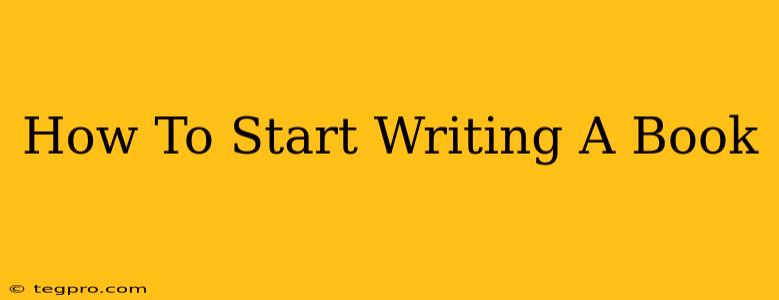So, you've decided to write a book. Congratulations! That's a huge undertaking, filled with both challenges and immense rewards. This comprehensive guide will walk you through the initial steps, helping you navigate the often daunting process of transforming your ideas into a finished manuscript.
1. Nurturing Your Book Idea: From Seed to Sapling
Before you dive into writing, you need a solid foundation. This isn't about having every detail perfectly planned – that can stifle creativity – but rather having a clear direction.
a) Brainstorming and Idea Generation:
- Freewriting: Set a timer for 15 minutes and just write. Don't worry about grammar or structure; let your ideas flow freely.
- Mind Mapping: Visually organize your thoughts. Start with your central theme and branch out with related ideas, characters, plot points, and settings.
- Character Sketches: Develop compelling characters with unique backstories, motivations, and flaws. What drives them? What are their weaknesses?
- Plot Outlines (optional): Some writers thrive on detailed outlines, while others prefer to discover the story as they write. Choose the method that best suits your style.
b) Developing Your Concept:
- Genre and Target Audience: Identifying your genre helps determine the expectations and conventions you'll need to consider. Understanding your target audience will guide your writing style and tone.
- Unique Selling Proposition (USP): What makes your book different? What unique perspective or story are you bringing to the table?
- Logline: Craft a concise one-sentence summary of your book. This will help you stay focused and ensure your story remains coherent.
2. Building Your Foundation: Structure and Planning
Once you have a strong concept, it's time to lay the groundwork for your book.
a) Creating an Outline:
- Chapter Breakdown: Divide your story into chapters, outlining the key events and plot points within each.
- Scene Planning: For each chapter, outline the individual scenes, focusing on the action, dialogue, and character development.
- Character Arcs: Map out how your characters will change and grow throughout the story.
b) Worldbuilding (if applicable):
For genre fiction like fantasy or science fiction, creating a detailed and believable world is crucial. Consider:
- Geography: Map out the landscape, including cities, towns, and natural features.
- Culture and Society: Develop the customs, beliefs, and social structures of your world.
- History and Mythology: A rich history can add depth and complexity to your world.
3. The Writing Process: Putting Pen to Paper (or Fingers to Keyboard)
Now comes the exciting part – actually writing your book!
a) Establishing a Writing Routine:
- Set Realistic Goals: Don't aim for perfection; aim for progress. Start with small, achievable goals and gradually increase your writing output.
- Dedicated Writing Space: Create a dedicated space where you can focus on your writing without distractions.
- Time Management: Schedule regular writing sessions into your day, treating them as important appointments.
b) Overcoming Writer's Block:
- Freewriting: As mentioned earlier, freewriting can help overcome creative blocks.
- Change of Scenery: Try writing in a different location.
- Read Widely: Immerse yourself in the genre you're writing in to spark new ideas.
4. Revision and Editing: Polishing Your Masterpiece
Once you've completed your first draft, the real work begins. Revision and editing are crucial for transforming a rough manuscript into a polished, publishable work.
a) Self-Editing:
- Read Aloud: This helps identify awkward phrasing and grammatical errors.
- Seek Feedback: Share your manuscript with trusted beta readers for constructive criticism.
- Focus on Structure and Pacing: Ensure your story flows logically and maintains a consistent pace.
b) Professional Editing:
Consider hiring a professional editor to provide a fresh perspective and catch any remaining errors.
Conclusion: Embark on Your Authorial Journey
Writing a book is a marathon, not a sprint. It requires dedication, perseverance, and a willingness to embrace the challenges along the way. By following these steps and staying committed to your vision, you can transform your book idea into a reality. Good luck, and happy writing!

